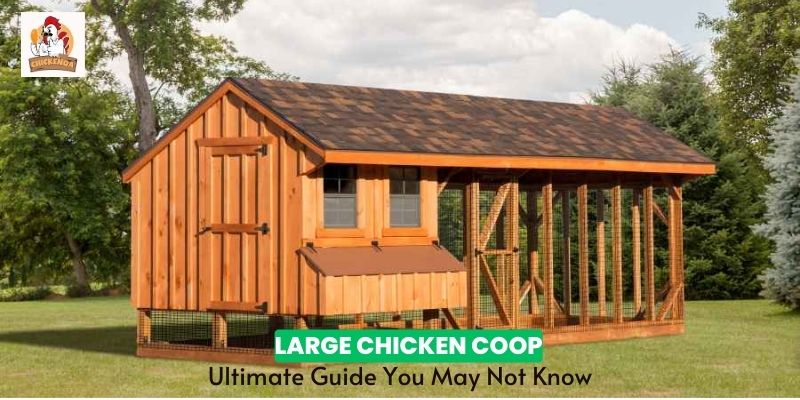Large Chicken Coop: Ultimate Guide You May Not Know by chickenqa.com. A basic construction, the large chicken coop is one of the most crucial parts of maintaining a happy, healthy flock of chickens. While the specifics of your coop will depend on the breed of your birds and your location, the fundamental procedures and important considerations outlined here can assist anybody in building a secure and durable coop!
The purpose of constructing a large chicken coop is to protect your chickens from dangers such as predators, wetness, drafts, sickness, overheating, cold, and escape. Making the proper decisions is essential for the welfare of your flock.
How Do I Determine What Size Chicken Coop I Need?
There are several things to take into account, such as the types of hens you have and if you may let them roam free. For instance, compared to Silkies, Australorps, Cochins, and Rhode Islands occupy more room. You should offer one nest box for every three to four hens since chickens share nesting boxes. Additionally, chickens don’t mind sharing a roosting bar with another chicken.

The exact square footage needed will depend on your arrangement and the breeds you have, so err on the side of caution and provide a little extra room. A large chicken coop for 10+ birds is an excellent place to start, even if you only have a few hens to begin with. It will also provide you adequate space for larger flocks.
Laying hens and broilers are raised by the poultry business in cramped conditions using artificial lighting. Give your hens some affection and the room they require.
Should I Consider A Run Extension?
Are your hens overcrowding or acting aggressively? The chickens may become irritable and start pecking one other in a tiny coop. This is where adding a chicken run extension to your large chicken coop layout may really help.
Your flock may safely feed, scratch, explore, take a brief dust bath, or just receive additional fresh air in a run extension. If there are many predators in your region and free-ranging is not a safe choice, it is a particularly wise decision.
Chickens that are crowded are cranky chickens, and grumpy hens may exhibit negative behaviors and lay fewer eggs. You’ll notice that your flock will be healthier and happier if you give them space to spread out.

How Often Should I Clean A Large Chicken Coop?
Perform little cleaning jobs in the hen house every day, thorough cleans once a week, and significant maintenance every 3-6 months for a beautiful coop.
Daily chores: Taking out any leftover food and always giving fresh food and drink is a terrific idea. Clean droppings from perches and nesting locations may be something to look for. You won’t need to do this every day if you use a waterer like ours since the horizontal nipples prevent contamination of the water supply.
Weekly Tasks: When you see filth, dust, cobwebs, dirty large chicken coop bedding, unclean nesting materials, or a buildup of chicken excrement, it’s time to clean your chicken house. Now is a wonderful time to look for and get rid of any mold or bugs. Make sure to replace any filthy nesting materials and rake and turn the coop’s floor bedding.
Deep Cleaning: Your large chicken coop need a thorough deep cleaning every three to six months. At this point, you should completely empty the coop, clean the walls and floors, disinfect it, replace all of the bedding, and check for any repairs that could be required. Salmonella may grow in a dirty coop, so it’s better to maintain it that way.
How Can I Predator-Proof A Large Chicken Coop?
Inadequate predator protection is one of the main mistakes we see people make when attempting to rear chickens. Predators can be found on land, in the air, or even underground. No matter the size or kind of your flock, having a predator-proof large chicken coop is essential if you want to raise hens.

One of the first choices you should make to keep your flock secure is where to put your chicken coop. A smart practice is to locate your chicken coop close to your house or barns. Because predators are scared of people, they are less likely to try to approach the coop if they hear or see people nearby.
Digging under your coop or run is one of the predators’ most popular tactics. A predator protection equipment, which will be available soon, will thwart them at this point. Custom-fit hardware cloth, which is far more durable than chicken wire, is included in the package. Using specially constructed brackets that are bolted into the frame, the hardware cloth is fastened to the coop. The hardware cloth is secured in place by the brackets’ tabs, which fasten to the hardware cloth. U stakes are used to anchor the central and outside borders of the hardware cloth. When predators try to burrow behind hardware cloth, they will run into an impenetrable barrier and be unable to grab your chicks if you cover it with dirt.


